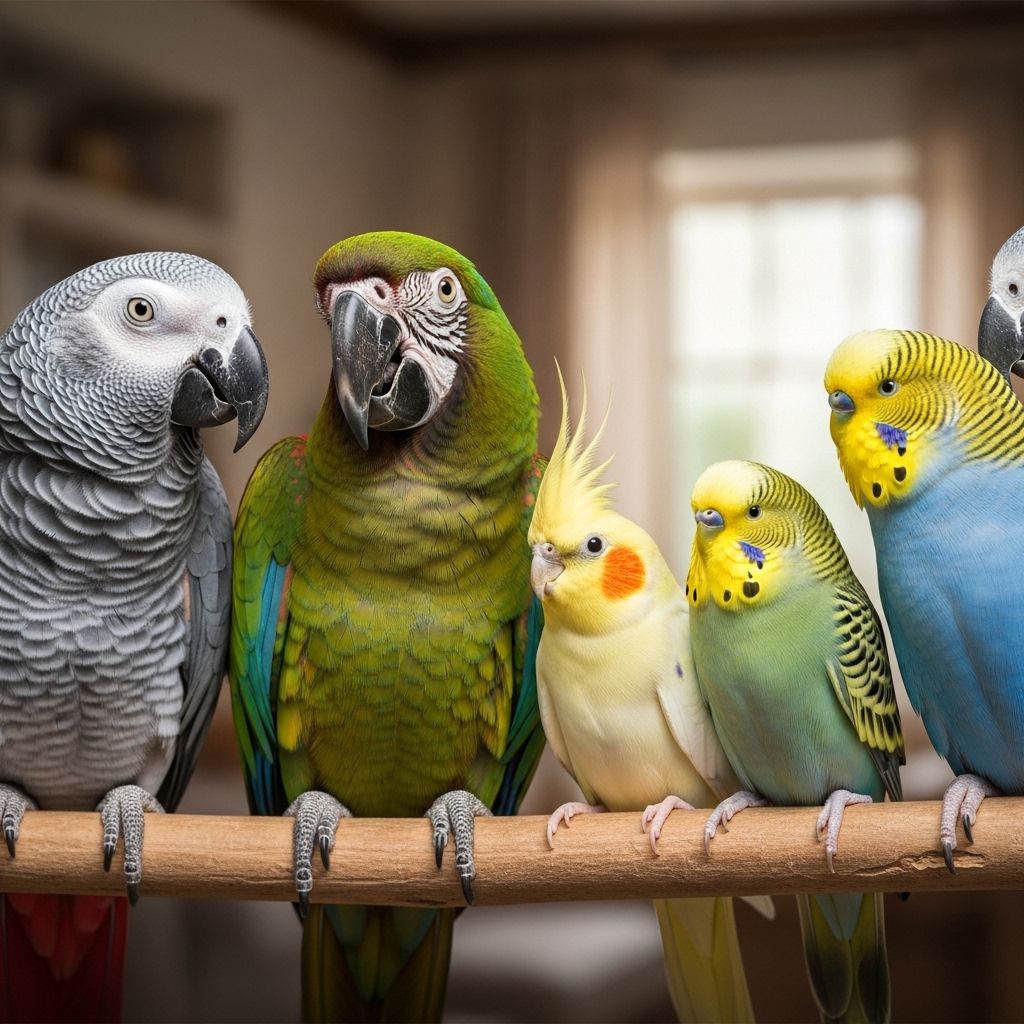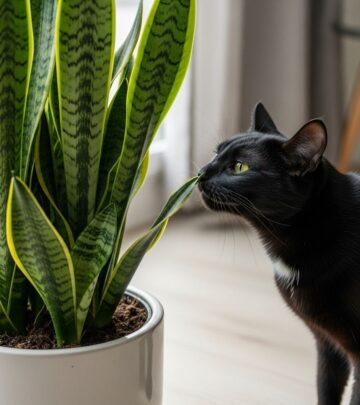Top Trainable Pet Bird Species: Best Choices for Intelligent Companions
Engaging training routines unlock the true potential of your feathered friend.

Image: HearthJunction Design Team
Birds are among the most intelligent animals kept as pets. Many species possess remarkable problem-solving skills, an eagerness to learn, and a playful curiosity that makes them excellent candidates for training. Whether you’re looking for a talkative parrot, a charming little budgie, or an entertaining cockatiel, this guide explores the most trainable pet bird species and what makes each of them a delightful and rewarding companion.
Why Choose a Trainable Bird?
Highly trainable birds offer more than just companionship—they can interact with you through learned behaviors, tricks, and even speech. Training mentally stimulates your bird, helps curb undesirable behaviors, and strengthens your bond. The most trainable birds tend to be those with high intelligence, social natures, and a willingness to interact with people and their environment.
Key Traits of Trainable Birds
- Intelligence: Birds with higher problem-solving skills learn cues, tricks, and complex routines quickly.
- Social temperament: The most trainable birds are usually friendly, outgoing, and enjoy human company.
- Vocal ability: Many trainable birds—especially parrots—are adept at mimicking sounds and speech.
- Playfulness: Engaged, curious birds are eager to interact and explore new behaviors.
Top 8 Most Trainable Pet Bird Species
The following bird species are renowned for their intelligence, ability to learn, and desire to engage with people. Each has its own unique set of trainable behaviors, care requirements, and personality traits.
1. Budgerigar (Budgie)
Budgerigars, commonly known as budgies or parakeets, are among the most popular pet birds for good reason. They’re small, easily handled, and exceptionally quick learners despite their size.
- Trainability: Budgies can quickly master tricks, step-ups, and are capable of mimicking words and short phrases.
- Why They Shine: Curious, friendly, and affectionate. Budgies thrive on interaction and form strong bonds with their owners.
- Care Needs: Provide a spacious cage and plenty of toys for mental stimulation. Social time outside the cage is highly beneficial.
- Lifespan: 8–15 years if well cared for.
2. Cockatiel
The cheerful cockatiel is famous for its gentle disposition, easy-going nature, and willingness to learn new behaviors.
- Trainability: Cockatiels excel at learning whistles, tunes, and simple tricks like turning around or climbing a ladder.
- Why They Shine: Gentle and friendly, cockatiels develop deep attachments to their human companions.
- Care Needs: Daily handling, a large cage, and mentally-stimulating toys are essential.
- Lifespan: 15–20 years.
3. Lovebird
Famous for their affectionate natures, lovebirds also rank high among the trainable bird species. Their lively curiosity fuels their eagerness to learn tricks and interact with their owners.
- Trainability: Lovebirds enjoy learning simple tricks, such as ringing a bell or retrieving objects.
- Why They Shine: Strong-willed, playful, and devoted. Lovebirds often prefer being kept in pairs but can form strong bonds with people if raised singly.
- Care Needs: Require daily interaction, lots of toys, and a secure environment.
- Lifespan: 10–15 years.
4. Parrotlet
Parrotlets may be among the smallest parrots, but they pack big personalities and are highly intelligent.
- Trainability: Capable of mastering step-ups, target-training, and even learning short phrases.
- Why They Shine: Quick learners, energetic, and feisty. Parrotlets thrive on focused training sessions.
- Care Needs: Require socialization and plenty of enrichment to prevent boredom-induced behaviors.
- Lifespan: 12–20 years.
5. Amazon Parrot
Renowned for their intelligence and vibrant personalities, Amazon parrots are among the superstar performers of the bird world.
- Trainability: Highly skilled at learning words, phrases, complex tricks, and engaging in interactive play.
- Why They Shine: Expressive, bold, and socially engaging. Amazon parrots love the spotlight and regular social interaction.
- Care Needs: Large cage, extensive socialization, and a varied diet. Can be demanding and require an experienced owner.
- Lifespan: Can exceed 40 years (several decades).
6. African Grey Parrot
African grey parrots are often considered the most intelligent of all pet birds, with some individuals demonstrating the problem-solving abilities of a young child.
- Trainability: Outstanding mimics with remarkable vocabularies; can recognize colors, objects, and numbers, and follow multi-step commands.
- Why They Shine: Extremely intelligent, sensitive, and form lifelong bonds with their humans.
- Care Needs: Require dedicated mental stimulation, training, and company to prevent behavioral issues.
- Lifespan: 40–60 years or more.
7. Macaw
With their stunning plumage and powerful beaks, macaws are not just beautiful—they’re clever, trainable, and affectionate with the right owner.
- Trainability: Capable of learning advanced tricks, talking, and performing interactive routines.
- Why They Shine: Big personalities, social, and form deeply loyal bonds.
- Care Needs: Require large enclosures, long-term training, social time, and high-quality food.
- Lifespan: 40–60 years or more.
8. Cockatoo
The playful and highly affectionate cockatoo enjoys impressive trainability, especially when it comes to learning fun tricks and dances.
- Trainability: Quick to learn tricks, dance, and perform behaviors in response to cues.
- Why They Shine: Extremely affectionate and sensitive. Cockatoos need lots of daily attention and interaction.
- Care Needs: Can be demanding and prone to behavioral issues if understimulated. Not for inexperienced owners.
- Lifespan: 40–70 years in captivity.
Other Notable Trainable Bird Species
- Sun Conure: Athletic, playful, and clever—great for active homes but known for their loud vocalizations.
- Canary: Known for beautiful songs rather than trick training. Less inclined to physical handling but can be tamed and enjoy interacting through their singing abilities.
- Pionus Parrot: Calm, intelligent, and learn slowly but steadily; often recommended for moderate-experience bird keepers.
- Eclectus Parrot: Known for clear talking and bright plumage, can learn to mimic quite well in calm, patient homes.
- Quaker Parakeet: Outgoing, clever, and talkative, these small parrots pick up words, tricks, and will bond closely with caretakers.
Training Tips for Success
- Start early: Young birds are often more receptive to new experiences, training, and handling.
- Use positive reinforcement: Offer treats, praise, or favorite toys to reward good behaviors.
- Keep sessions short and regular: Frequent five to ten-minute sessions usually work best.
- Be patient and consistent: Progress will happen with repetition and gentle encouragement.
- Respect comfort level: Some species are more hands-on than others. Don’t force handling if your bird resists at first, especially with shy types like canaries.
Caring for Intelligent and Trainable Birds
Birds with higher intelligence and trainability often come with greater care requirements. They thrive on routine, enrichment, and lots of interaction. Neglect, boredom, and lack of mental challenges can result in unwanted behaviors such as screaming, feather plucking, or aggression.
- Provide a roomy cage or aviary to allow for exercise and movement.
- Offer a variety of toys—puzzles, foraging items, and swings stimulate curiosity and reduce boredom.
- Allow daily out-of-cage time for socialization and exercise where safe and possible.
- Ensure a varied, species-appropriate diet to maintain health and mental acuity.
- Prioritize bonding and training activities to keep your bird happy and engaged.
How to Choose the Right Trainable Bird for You
| Species | Trainability | Vocal Ability | Lifespan | Best For |
|---|---|---|---|---|
| Budgerigar | High | Moderate (some talkers) | 8–15 years | Beginners, families, smaller spaces |
| Cockatiel | High | High (whistles, some talking) | 15–20 years | Beginners, all ages |
| Lovebird | Moderate | Low | 10–15 years | Active households, singles/pairs |
| Amazon Parrot | Very High | Exceptional | 40+ years | Experienced owners |
| African Grey | Exceptional | Excellent (talkers, mimics) | 40–60 years | Dedicated, experienced owners |
| Macaw | Very High | Moderate to high | 40–60 years | Owners with space & time |
| Cockatoo | Very High | Moderate | 40–70 years | Affectionate, hands-on caretakers |
| Parrotlet | High | Moderate | 12–20 years | Energetic, intermediate owners |
Frequently Asked Questions (FAQs)
Q: Which bird species is easiest to train for beginners?
Budgerigars and cockatiels are generally considered the most beginner-friendly trainable birds due to their small size, forgiving nature, and eagerness to learn.
Q: Are highly trainable birds always noisy?
Not always, but many of the most intelligent, trainable birds have loud calls, such as amazons, cockatoos, and conures. Budgies and cockatiels are relatively quieter in comparison, though all birds make some noise.
Q: How much time do I need to train a pet bird?
Training should be a daily routine, even just 10–15 minutes per day. Birds also require multiple sessions each week for effective learning and bonding.
Q: Can I keep a trainable bird if I have other pets like cats?
It is possible with careful supervision and a gradual introduction. Always prioritize your bird’s safety by keeping it out of reach when unsupervised, and introduce pets slowly to teach boundaries.
Q: Will my bird learn human words?
Many parrot species (budgies, amazons, African greys) can mimic words and phrases, but there is no guarantee. Some birds never talk, but will whistle or mimic environmental sounds instead.
Final Thoughts
Choosing a trainable bird species can add years of delightful companionship to your life. When provided with patience, mental enrichment, and proper training methods, these birds display remarkable intelligence and endearing personalities. Take the time to select a species that matches your environment and lifestyle—both you and your winged companion will be rewarded by a lifetime of learning and play.
References
- https://www.wideopenspaces.com/sun-parakeets/
- https://www.petplace.com/article/general/pet-behavior-training/can-i-get-a-pet-bird-if-i-have-a-cat
- https://www.tracyvets.com/site/blog/2021/08/30/types-of-pet-birds
- https://www.petful.com/pet-health/buying-an-exotic-pets/
- https://www.petmd.com/bird/how-long-do-parrots-live
Read full bio of Shinta












